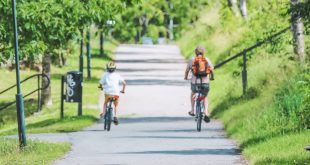Hugh Lambert works in the Information Technology Department for the Eastern Band of Cherokee Nation in North Carolina. He also now cycles, an activity he says helped him lose weight and – via an organised, long-distance group ride – reconnect with his ancestors.
Part of his induction into the life of a cyclist was by listening to The Spokesmen podcast, an industry round-table discussion hosted by David Bernstein of The Fredcast US-based road cycling podcast, and co-hosted by Carlton Reid, executive editor of BikeBiz.com.
"Until Feb 28, 2011 I hadn’t been on a road bike since I tried to ride one to work in the late 80s," said Lambert.
"Then, in March last year I was selected as one of six Eastern Cherokees to retrace the 975 mile Trail of Tears from Georgia to Oklahoma. I was 54 years old, and had had a history of obesity, diabetes and high blood pressure. About this time I discovered The Spokesmen."
Writing to US journalist Neil Browne, one of the regular guests on the Spokesmen show, Labert said: "You all really helped this old fat fart keep up with a bunch of high school students as we hit the road for three weeks. By the time of the ride I’d lost 75 pounds and now it’s 90 pounds – I’m down to 205 and I mostly have cycling to thank for it."
Lambert is now one of the organizers for the 2012 Remember the Removal Ride, which honours Cherokees both living and dead on by retracing the Trail of Tears for 950 miles. The group rides from the original Cherokee homelands and the old capitol New Echota in Georgia, up through Tennessee, Kentucky and Illinois. They then continue into Missouri, down through Arkansas and end in Tahlequah, OK, the capitol of the Cherokee Nation. The event provides participants with the chance to experience Cherokee history first hand. Most riders describe the ride as a life-changing experience.
"This is a huge thing for us as Indian people – riding bikes along the actual northern route of that terrible trail – has begun a healing process that would not have been possible if we’d done it by car or bus," said Lambert.
"We would, from time to time, get off of the bikes and literally walk in our ancestor’s footsteps. Bikes are changing lives for the better here on ‘the rez’. I just started a cycling club in Cherokee, on the reservation, and I’m trying to start a club at the local high school – no small task as cycling is considered a ‘Unega’ [white] activity.
"I wanted to thank all [the Spokesmen guests]. I appreciate it – Neil, and David and Carlton and Donna and all the Spokesmen have become friends I don’t get to hear from often enough. You guys don’t even know you’ve helped heal 200 year old wounds."
 BikeBiz Bicycle and cycling retail news
BikeBiz Bicycle and cycling retail news



